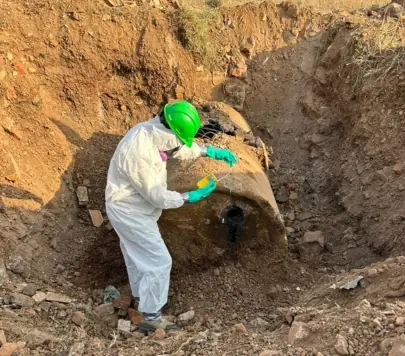Soil pollution is a growing concern, affecting food, water, and overall human health. Industrial waste plays a major role in degrading soil quality. Every year, factories and industries release harmful chemicals, heavy metals, and toxic waste into the environment. This not only harms the land but also affects water sources, crops, and ecosystems.
Many people don’t realize the severity of this issue. Polluted soil can lead to poor agricultural output, unsafe living conditions, and irreversible environmental damage. Fortunately, solutions exist to clean up contaminated land. Understanding the effects of industrial waste and exploring soil contamination and remediation methods can help protect the environment and ensure a healthier future.
How Industrial Waste Ends Up in Soil
Industrial activities generate tons of waste, much of which ends up in the soil. Some of the common ways industrial waste contaminates land include:
Chemical Spills: Factories often use hazardous chemicals that can leak or spill into the ground. These substances seep into the soil and remain for years, making the land unfit for farming or construction.
Improper Waste Disposal: Some industries do not follow proper disposal methods. Dumping toxic waste directly into landfills or open fields can pollute the soil and nearby water bodies.
Airborne Contaminants: Industrial facilities release smoke and pollutants into the air. Over time, these chemicals settle into the soil, leading to contamination.
Leaking Underground Storage Tanks: Many industries store oil and chemicals in underground tanks. If these tanks leak, the toxic substances mix with the soil and spread to larger areas.
Understanding these causes is the first step toward finding effective soil contamination and remediation techniques.
The Hidden Dangers of Soil Pollution
Contaminated soil doesn’t just affect the ground—it impacts everything around it. Here are some key dangers:
Harm to Human Health: People living near polluted areas face serious health risks, including respiratory problems, skin infections, and even long-term diseases like cancer.
Reduced Crop Yield: Contaminated soil loses its fertility, affecting farmers and food production. Crops grown in such soil may absorb toxins, making them unsafe for consumption.
Water Pollution: Toxic chemicals from the soil can seep into groundwater, contaminating drinking water supplies and affecting aquatic life.
Loss of Biodiversity: Polluted soil harms plants and animals, disrupting the natural balance of ecosystems.
Recognizing these dangers is crucial for taking immediate action against soil pollution.
Methods to Clean Contaminated Soil
Restoring polluted soil requires specialized techniques. Some of the most effective methods include:
1. Bioremediation
This technique uses natural organisms like bacteria and fungi to break down harmful substances in the soil. These microorganisms consume toxic chemicals and convert them into harmless compounds.
2. Soil Washing
In this method, soil is removed and washed with a special solution that separates contaminants. The cleaned soil is then returned to its original location.
3. Thermal Remediation
Heating the soil to high temperatures helps break down pollutants. This method is useful for removing volatile organic compounds (VOCs) and other hazardous substances.
4. Encapsulation
Sometimes, pollutants cannot be removed. Instead, they are contained using barriers or chemicals to prevent them from spreading further.
5. Phytoremediation
Certain plants, like sunflowers and willow trees, can absorb heavy metals and toxins from the soil. These plants help clean the land over time.
Many soil remediation companies use a combination of these methods to restore land for safe use.
The Role of Soil Remediation Companies
Dealing with soil pollution requires expertise. The reputed companies specialize in cleaning contaminated land. Their role includes:
Site Assessment: Experts analyze the soil to determine the level of contamination and the best method for cleaning it.
Developing Remediation Plans: Based on the analysis, companies create a customized plan to remove or neutralize pollutants.
Implementing Cleanup Techniques: Using advanced technologies, professionals restore the soil to a safe condition.
Monitoring and Maintenance: Even after remediation, companies continue to monitor the soil to ensure it remains free from contaminants.
Hiring professionals ensures that the remediation process is efficient and meets environmental safety standards.
Steps Everyone Can Take to Prevent Soil Pollution
While industries play a major role in soil pollution, individuals can also contribute to reducing contamination. Here’s how:
Proper Waste Disposal: Avoid dumping household chemicals, batteries, or plastics in open landfills.
Reduce Chemical Use: Opt for organic fertilizers and pesticides instead of harmful chemicals.
Support Clean Industries: Encourage businesses that follow eco-friendly waste management practices.
Participate in Community Clean-Ups: Engage in soil conservation efforts and spread awareness about pollution.
By taking small steps, we can collectively help in reducing soil pollution and promoting a healthier environment.
Restoring Our Land for Future Generations
Industrial waste has severely impacted soil quality worldwide. However, with proper soil contamination and remediation strategies, we can restore polluted land. Governments, businesses, and individuals must work together to prevent further damage. Investing in soil remediation companies and adopting sustainable practices can lead to cleaner and healthier surroundings.
For expert soil remediation solutions, EPSCO India provides industry-leading services to restore contaminated land efficiently and safely.










